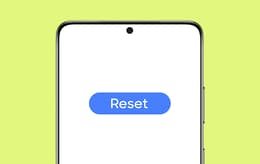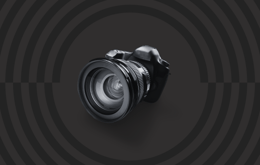
At Back Market’s annual Slow Tech Uprising Summit in Paris, representatives from the world’s most socially conscious brands celebrated building community and plotted a path forward in making the circular economy the new norm.
“When I co-founded this business 11 years ago, the world was locked in a vicious cycle of fast tech,” recalled Back Market’s CEO Thibaud Hug de Larauze during his opening presentation at our annual Slow Tech Uprising Summit in Paris.
“It was very clear: you buy new, you upgrade a year later, you put the old device in a cupboard to gather dust, or it gets thrown in the trash and ends up as e-waste. Imagining an alternative was very difficult.”
But to paraphrase the late John Lennon, imagining an alternative is now easy if you try. Eleven years later and Back Market is now on course to reach €3bn in gross merchandising value, responsible for helping turn ideas like refurbished tech, repair culture, and the prioritisation of second-hand devices into cultural norms. “Repair, resell, refurbishment are all terms that have fully entered the mainstream vernacular,” Hug de Larauze continued.
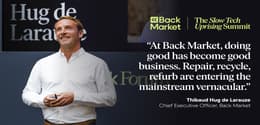
“Our market penetration has grown tenfold over the last decade, and it’s clear that consumers are stepping off the treadmill of always more and faster upgrades. The spell of fast tech is finally fading. I believe that 10 years from now, the circular economy for tech products won’t just be niche… but it will be completely dominant.”
A chance to celebrate the rise of the circular economy and the individuals doing their bit to put the brakes on Fast Tech, subsequently altering a toxic upgrade culture contributing to global e-waste rising by 2.6 million tonnes annually, the central idea underpinning Back Market’s Slow Tech Uprising Summit was one of cultivating passionate communities.
Making circularity cool
During a panel appropriately titled ‘Enough Already! Our Collective abandonment of everything fast’, Peter Semple, the CEO of online fashion flea market Depop, said the impressive growth of his business [which hit $788m sales in 2024] has been driven by making circularity in fashion feel genuinely cool. “Our ultimate mission has always been to teach people better choices when it comes to shopping second hand over first hand,” he said. “We’ve done this by making second-hand fashion a genuine form of open self-expression, so when people are doing it it’s an extension of their personality.”
Semple continued: “Rappers like Doechii and Central Cee have independently referenced Depop in their lyrics, which I believe is proof of how you can get the circular economy naturally ingrained into pop culture through prioritising making it cool over preachy. At a time where tens of millions of tonnes of waste are coming from fashion annually, there’s still a long way to go! But I think the fact we have 44 million people registered to a second-hand fashion retailer like Depop is valuable; it shows the potential to reverse those numbers.”
Dr. Kaitlyn Regehr, the author of the book Smartphone Nation, also stressed the power of cultivating passionate communities, arguing that this is the only way the circular economy can grow from something niche to everyday. “Whether it is Depop or Back Market, we need to think of everyone as one community, because government policy only follows the collective public will,” she said.
“Only we can decide that we want to break free from the constructs of the attention economy and fast technology that’s getting increasingly more advanced at manipulating us.” According to Back Market’s chief marketing officer Joy Howard, searches and mentions of the word ‘Slow Tech’ have risen by 95% over the last year on social media platform Reddit.
Meanwhile, Reddit conversations around ‘Repair’ and ‘Re-use’ accelerated by 82%. “This data proves people are getting the ‘ick’ around being locked into financially predatory smartphone contracts,” Howard said. “The data backs up the fact consumers are now making more socially conscious decisions.”
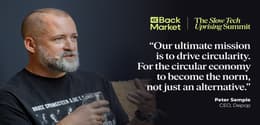
Becoming less reliant on big tech
Whether it’s criticising Elon Musk or pointing out the holes in the so-called "Silicon Valley hype machine", the Canadian tech journalist Paris Marx isn’t afraid to ruffle feathers within the tech world. And during his speech at Back Market’s Slow Tech Uprising Summit, Marx made it clear that while it’s important to drive everyday consumers into embracing the circular economy, there’s more that needs to be done to stop government bodies from being so closely aligned with tech firms that have a vested interest in keeping Fast Tech culture going.
“If you look at the local government bodies from Denmark, Germany and France they’re all locked into Windows or Apple technology,” Marx said. “Maybe there’s this fear around going against the US tech giants, but this is the moment for Europe to plot its own path forward and not to be so dependent on American platforms to communicate, buy things, and send emails.
“In Canada we’re trying to build our own central cloud system, which is a good start. You can’t truly drive a circular economy and get people to slow down around upgrading if your country’s change-making institutions are locked into shiny Big Tech that serves the opposite purpose.”
One way Back Market is trying to break the reliance on the latest devices and software from Big Tech companies is via the launch of its new Obsolete Computer category. This will essentially take laptops no longer supported - like Windows 10 devices, which will soon be written off by Microsoft - and ensure they are un-bricked and can still be updated. “Anyone can un-brick their old devices now. There is no need for a device to go to a landfill, because we’ve got a better solution!” boasted Back Market’s chief product officer Amandine Durr.
Durr highlighted that the share of refurbished smartphones in the EU grew 33% over the last 3 years, outpacing the flatter global electronics industry growth of 6%. This, she says, is proof of widespread hunger among consumers to be less reliant on Big Tech. The number one barrier to buying refurbished remains concerns around battery, but Durr revealed Back Market will soon launch a new battery replacement programme to alleviate these concerns: “People are realising everyday they are perfectly happy with a simpler link to technology. They want devices that actually last and can be repaired.”
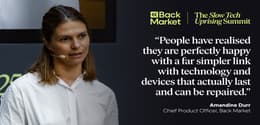
Taking it to the next level
When asked if the circular economy was still too low of a business opportunity for brands to fully embrace, Christine Goulay, the founder of consultancy firm Sustainabelle, passionately disagreed. “If you look at Decathlon, then in 2024 their gross revenue from circular business models hit $500m. These numbers prove this absolutely is a growing business model and that brands would be foolish to ignore it,” said Goulay.
“We’re at a point in history where the majority of consumers can’t simply look at a pile of old clothes or electronics as waste anymore. The idea of burning them seems rash! Our whole value system has changed – we’ve opened Pandora's box for the circular economy and there’s no going back.”
Goulay was speaking as part of the ‘Built to Last: Heritage, Regeneration and Designing For Forever’ panel at the Slow Tech Up Rising Summit, with its participants all in agreement around the circular economy’s ability to take things to the next level. “We are moving away from a linear economy that we don’t need anymore,” added Dounia Wone, chief impact officer at the Vestiaire Collective.
“We need to answer to climate justice and social justice, particularly in the fashion and textile industries. It’s critical we re-think how we sell and consumers re-think how we buy [over the coming years]. It’s about reinforcing that second-hand is always better than buying first-hand.”
For Marianne Gybels, senior director of sustainability at Vinted, the best way to take the circular economy to the next level is creating a second-hand business model primed to convert buyers into sellers. “I know I am biased, but I do believe Vinted is a great example of how circularity can work,” she said. “We are in 23 markets across the EU and 50% of our buyers convert into sellers.
“We’ve found a way to make people wake up to the value of what’s in the back of their wardrobes and to show there’s no need to waste something if you’re not wearing it anymore. That conversion from sellers to buyers is crucial for taking things to the next level [as an industry].”
Looking ahead to the future, Back Market’s CEO Thibaud Hug de Larauze said it is bright for second-hand devices, and that he expects a fundamental shift over the coming years. “From Gen Z to Gen X, people are tired and they are stepping off the treadmill of fast tech, fast fashion, disposable everything.”
His closing comments summarised Back Market’s core vision: slow tech is the most forward-thinking model to guarantee a sustainable future: “Slow tech is not about slowing down,” he concluded, “it's about moving forward on our own terms. It is about keeping what works, repairing what breaks, and reimagining what is possible.”









